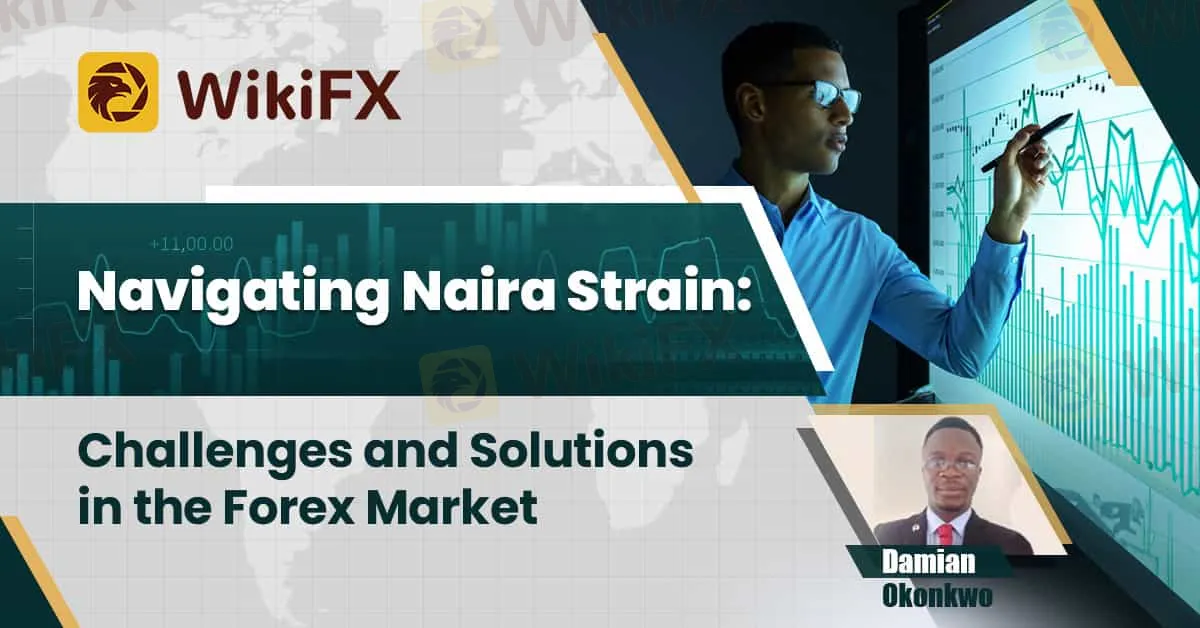简体中文
繁體中文
English
Pусский
日本語
ภาษาไทย
Tiếng Việt
Bahasa Indonesia
Español
हिन्दी
Filippiiniläinen
Français
Deutsch
Português
Türkçe
한국어
العربية
Navigating Naira Strain: Challenges and Solutions in the Forex Market
Abstract:The Nigerian Naira has been under pressure in recent times, grappling with currency depreciation and heightened volatility in the foreign exchange (forex) market. Experts attribute this strain to a confluence of factors, especially the dollar scarcity amidst the high supply of Naira in the market.

By: Damian Okonkwo

Naira Continuous devaluation: Understanding the Challenges:
The Nairas strong devaluation recently has been attributed to several factors:
● Demand-Supply Imbalance: Nigeria's reliance on imported goods creates a constant demand for foreign currency, while oil export earnings, the nation's primary source of forex, have fluctuated due to global oil price movements. This imbalance puts pressure on the Naira's value.
● Policy Uncertainty: Concerns regarding government policies, such as capital controls and exchange rate management strategies, can deter foreign investors and lead to capital flight, further weakening the Naira.
● Global Economic Pressures: Global factors like rising inflation and interest rate hikes by major economies can lead to capital outflows from emerging markets like Nigeria, impacting the Naira's exchange rate.
Navigating the Naira devaluations in the Forex Market:
There are some important strategies that investors could apply to withstand the Naira devaluations. Among them are:
● Hedging Strategies: Businesses and individuals can utilize hedging instruments like forwards, futures, and options contracts to mitigate forex risk and protect their financial positions from adverse currency fluctuations.
● Diversification: Diversifying forex exposure by investing in a basket of currencies can help reduce risk associated with the Naira's depreciation.
● Prioritizing Local Alternatives: Supporting domestically produced goods and services can help reduce reliance on imports and ease demand pressures on foreign currency.
Government Policy and Long-Term Solutions:
The government too has got some important roles to play towards reviving the Naira again. These can include:
● Promoting Non-Oil Exports: Encouraging the diversification of the export base by fostering the growth of non-oil exports can generate alternative sources of forex inflows and reduce dependence on oil revenue.
● Foreign Investment Incentives: Implementing policies that attract foreign direct investment (FDI) can bring in much-needed capital, promote job creation, and boost economic growth.
● Building External Reserves: Maintaining healthy external reserves provides a buffer against external shocks and helps stabilize the forex market during periods of volatility.
Conclusion
The current forex market situation in Nigeria presents a complex landscape, demanding a nuanced approach. By understanding the challenges, adopting appropriate risk management strategies, and advocating for long-term solutions, individuals and businesses can contribute to a more stable and predictable financial environment, fostering economic prosperity in Nigeria.

Disclaimer:
The views in this article only represent the author's personal views, and do not constitute investment advice on this platform. This platform does not guarantee the accuracy, completeness and timeliness of the information in the article, and will not be liable for any loss caused by the use of or reliance on the information in the article.
Read more

Thinking of Investing? Read Must-Know Facts About Funding pips!
When you check the internet for Funding Pips, you'd be surprised to know it's filled with praise for Funding Pips but often lacks the real facts that traders need. Everything that seems too good to be true should always be verified first. It could be Fraud . So, we conducted research and collected several facts you must know about Funding Pips.

OctaFX Back in News: ED Attaches Assets Worth INR 134 Cr in Forex Scam Case
The Enforcement Directorate (ED) in Mumbai has attached assets worth around INR 131.45 crore. This included a luxury yacht and residential properties in Spain. Read this interesting story.

Truth About Angel One – Here’s What You Need to Know
Thinking about investing in Angel One? Wait! Know the essential things about the broker before Invest. It could be SCAM. Read, think, and invest .

Investing Capital in Focus as Complaints on Withdrawal and Other Issues Mount
Explore this guide we have exposed Investing Capital, which has mounted concerns for traders by disallowing withdrawals and making them lose their hard-earned money.
WikiFX Broker
Latest News
Global Brokers Vs. Indian Rules: Why They Struggle in India
Services Surveys Signal 'Expansion' In June, Inflation Fears Remain High
ASIC cancels AFS licences of Ipraxis and Downunder Insurance Services
CFD Brokers Face Dual Compliance Pressures Ahead of 2026: Australia and EU Tighten Rules
FxPro to Launch Crypto Trading Desk, Deepening Digital Asset Push
CFI Financial Group Becomes Official Online Trading Partner of Etihad Arena
Discover 5 Benefits of Trading with Trive FX Broker
Major Risks Associated with AuxiliumFX: You Need to Know
IPO market gets boost from Circle's 500% surge, sparking optimism that drought may be ending
Asia-Pacific markets trade mixed ahead of Trump's deadline for higher tariffs
Currency Calculator


